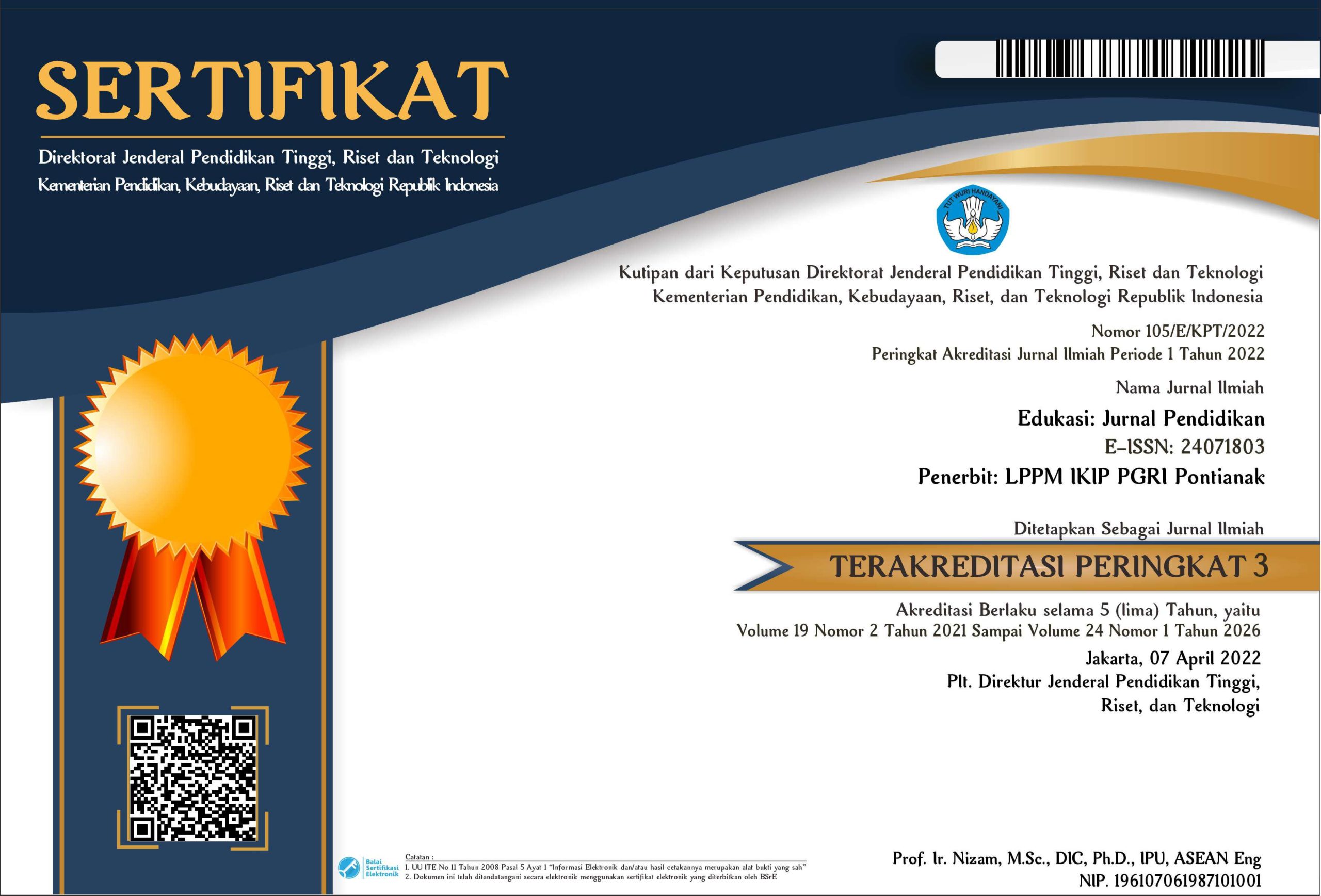THE POTENTIALS AND CHALLENGES OF MOBILE-ASSISTED LANGUAGE LEARNING (MALL) FOR EFL/ESL LEARNERS
DOI:
https://doi.org/10.31571/edukasi.v21i2.6054Keywords:
Mobile-assisted Language Learning (MALL), mobile learning, educational technologyAbstract
Mobile-assisted Language Learning (MALL) studies have indicated promising potentials for English language learning enhancement. However, since the implementation of MALL can be viewed as the process of transition from physical learning to e-learning, the implementation has also faced challenges in real practices. Thus, this study aims to review the opportunities and challenges that have been experienced by EFL/ESL learners in the implementation of MALL. Using descriptive qualitative method, the study was done by employing library research to collect the data. The study reviewed 30 publications in the MALL implementation area. The data were analyzed based on the reported potentials and challenges in the MALL implementation. They were then categorized into the subthemes describe the potentials and challenges. The findings showed a variety of benefits and issues in MALL implementation.
Downloads
References
Al-Shehab, M. A.-S. (2020). The Role of Mobile-assisted Language Learning (MALL) in Enhancing the Writing Skills of Intermediate IEP Students: Expectations vs Reality. Language Teaching Research Quarterly, 20. https://doi.org/10.32038/ltrq.2020.20.01
Bahari, A., & Gholami, J. (2022). A Systematic Review of Current Research on Affordances and Challenges of Technology-Assisted Grammar Learning. CALL-EJ, 23(1).
Çakmak, F. (2019). Mobile learning and Mobile Assisted Language Learning in focus. In Language and Technology.
Daǧdeler, K. O., Konca, M. Y., & Demiröz, H. (2020). The effect of mobile-assisted language learning (MALL) on EFL learners’ collocation learning. Journal of Language and Linguistic Studies, 16(1). https://doi.org/10.17263/JLLS.712891
Fang, W. C., Yeh, H. C., Luo, B. R., & Chen, N. S. (2021). Effects of mobile-supported task-based language teaching on EFL students’ linguistic achievement and conversational interaction. ReCALL, 33(1). https://doi.org/10.1017/S0958344020000208
GarcÃa Botero, G., Questier, F., & Zhu, C. (2019). Self-directed language learning in a mobile-assisted, out-of-class context: do students walk the talk? Computer Assisted Language Learning. https://doi.org/10.1080/09588221.2018.1485707
Ghorbani, N., & Ebadi, S. (2019). Exploring learners’ grammatical development in mobile assisted language learning. Cogent Education. https://doi.org/10.1080/2331186X.2019.1704599
Gonulal, T. (2019). The use of instagram as a mobile-assisted language learning tool. Contemporary Educational Technology. https://doi.org/10.30935/cet.590108
Guo, M., & Wang, M. (2018). Integrating WeChat-based Mobile-Assisted Language Learning into College English Teaching. EAI Endorsed Transactions on E-Learning. https://doi.org/10.4108/eai.25-9-2018.155646
Hashim, H., Md. Yunus, M., Amin Embi, M., & Mohamed Ozir, N. A. (2017). Mobile-assisted Language Learning (MALL) for ESL Learners: A Review of Affordances and Constraints. Sains Humanika. https://doi.org/10.11113/sh.v9n1-5.1175
Hazaea, A. N., & Alzubi, A. A. (2018). Impact of mobile assisted language learning on learner autonomy in EFL reading context. Journal of Language and Education, 4(2). https://doi.org/10.17323/2411-7390-2018-4-2-48-58
Hidayati, T., & Diana, S. (2022). Students’ Motivation to Learn English Using Mobile Applications: The Case of Duolingo and Hello English. JEELS (Journal of English Education and Linguistics Studies), 6(2). https://doi.org/10.30762/jeels.v6i2.1233
Imamyartha, D., Wahjuningsih, E., A’yunin, A., Santihastuti, A., Mitasari, Fauzie, D. L. T. A., & Andika, E. C. H. (2022). EFL LEARNERS’ ENGAGEMENT AND LEARNING MOTIVATION IN TEAM-BASED MOBILE LANGUAGE LEARNING THROUGH WHATSAPP. Teaching English with Technology, 1.
Kacetl, J., & KlÃmová, B. (2019). Use of smartphone applications in english language learning—A challenge for foreign language education. In Education Sciences. https://doi.org/10.3390/educsci9030179
Khubyari, L., & Narafshan, M. H. (2016). A study on the impact of MALL (Mobile Assisted Language Learning) on EFL learners’ reading comprehension. International Journal of English Language Teaching, 4(2), 58–69.
Kim, D., Ruecker, D., & Kim, D. J. (2017). Mobile assisted language learning experiences. International Journal of Mobile and Blended Learning. https://doi.org/10.4018/IJMBL.2017010104
Klopfer, E., & Squire, K. (2008). Environmental detectives-the development of an augmented reality platform for environmental simulations. Educational Technology Research and Development, 56(2). https://doi.org/10.1007/s11423-007-9037-6
Kohnke, L., Zhang, R., & Zou, D. (2019). Using mobile vocabulary learning apps as aids to knowledge retention: Business vocabulary acquisition. Journal of Asia TEFL, 16(2). https://doi.org/10.18823/asiatefl.2019.16.2.16.683
Le, P. T. T. (2021). Incorporating Internet-Based Applications in Teaching Integrated Language Skills to EFL Students. Proceedings of the 17th International Conference of the Asia Association of Computer-Assisted Language Learning (AsiaCALL 2021). https://doi.org/10.2991/assehr.k.210226.006
Lee, S. M. (2022). A systematic review of context-aware technology use in foreign language learning. Computer Assisted Language Learning, 35(3). https://doi.org/10.1080/09588221.2019.1688836
Lin, C. J., Hwang, G. J., Fu, Q. K., & Cao, Y. H. (2020). Facilitating EFL students’ English grammar learning performance and behaviors: A contextual gaming approach. Computers and Education, 152. https://doi.org/10.1016/j.compedu.2020.103876
Lin, J. J., & Lin, H. (2019). Mobile-assisted ESL/EFL vocabulary learning: a systematic review and meta-analysis. Computer Assisted Language Learning. https://doi.org/10.1080/09588221.2018.1541359
Liu, M. (2020). The Effect of Mobile Learning on Students’ Reading Self-Efficacy: A Case Study of the APP “English Liulishuo.†English Language Teaching, 13(12). https://doi.org/10.5539/elt.v13n12p91
Loewen, S., Crowther, D., Isbell, D. R., Kim, K. M., Maloney, J., Miller, Z. F., & Rawal, H. (2019). Mobile-assisted language learning: A Duolingo case study. ReCALL. https://doi.org/10.1017/S0958344019000065
Metruk, R. (2020). EFL learners’ perspectives on the use of smartphones in higher education settings in Slovakia. Electronic Journal of E-Learning, 18(6). https://doi.org/10.34190/JEL.18.6.006
Nami, F. (2020). Educational smartphone apps for language learning in higher education: Students’ choices and perceptions. Australasian Journal of Educational Technology, 36(4). https://doi.org/10.14742/ajet.5350
Osifo, A. (2019). Improving collaboration in blended learning environments through differentiated activities and mobile-assisted language learning tools. Proceedings of the 15th International Conference on Mobile Learning 2019, ML 2019. https://doi.org/10.33965/ml2019_201903l001
Pastore, R. S., Land, S. M., & Jung, E. J. (2011). Mobile computing in higher education. In Technology Integration in Higher Education: Social and organizational aspects (pp. 160–173). IGI Global.
Rinanda, D., Suparno, S., & Tarjana, S. S. (2019). Students’ Perceptions towards Using Mobile Application in Learning Speaking. ELS Journal on Interdisciplinary Studies in Humanities, 2(4). https://doi.org/10.34050/els-jish.v2i4.8232
Sato, T., Murase, F., & Burden, T. (2020). An empirical study on vocabulary recall and learner autonomy through mobile-assisted language learning in blended learning settings. CALICO Journal, 37(3). https://doi.org/10.1558/cj.40436
Åžen, N. S. (2021). A Critical Review on the Mobile Assisted Language Learning with a Focus on Empirical Studies ARTICLE INFO. Journal of Learning and Teaching in Digital Age, 6(2).
Soleimani, H., & Pourrasa, E. (2021). Iranian Novice and Experienced EFL Teachers’ Perspectives on Challenges and Affordance of Mobile Assisted Language Learning (MALL) in an EFL Context. Quarterly of Iranian Distance Education Journal, 3(2).
Solihin, S. (2021). Using Mobile Assisted Language Learning (MALL) to Teach English in Indonesian Context: Opportunities and Challenges. VELES: Voices of English Language Education Society, 5(2), 95–106.
Thongsri, N., Shen, L., & Yukun, B. (2019). Does academic major matter in mobile assisted language learning? A quasi-experimental study. International Journal of Information and Learning Technology, 36(1). https://doi.org/10.1108/IJILT-05-2018-0043
Walsh, R. (2021). Teaching Communicatively in a Classroom with Mobile-sourced Materials. Advances in Language and Literary Studies, 12(5). https://doi.org/10.7575/aiac.alls.v.12n.5.p.23
Wrigglesworth, J. (2020). Using smartphones to extend interaction beyond the EFL classroom. Computer Assisted Language Learning, 33(4). https://doi.org/10.1080/09588221.2019.1569067
Wu, J. G., & Miller, L. (2020). Improving English Learners’ Speaking through Mobile-assisted Peer Feedback. RELC Journal, 51(1). https://doi.org/10.1177/0033688219895335
Xu, Q. (2020). Applying MALL to an EFL listening and speaking Course : An Action Research Approach. The Turkish Online Journal of Educational Technology, 19(4).
Zakian, M., Xodabande, I., Valizadeh, M., & Yousefvand, M. (2022). Out-of-the-classroom learning of English vocabulary by EFL learners: investigating the effectiveness of mobile assisted learning with digital flashcards. Asian-Pacific Journal of Second and Foreign Language Education, 7(1), 1–16.
Downloads
Published
How to Cite
Issue
Section
License
Copyright (c) 2023 Eko Sanjaya

This work is licensed under a Creative Commons Attribution-NonCommercial 4.0 International License.
Authors who publish in this journal agree to the following terms:
- Authors retain copyright and grant the journal the right of first publication with the work simultaneously licensed under a Creative Commons Attribution License (CC-BY-NC) that allows others to share the work with an acknowledgment of the work's authorship and initial publication in this journal.
- Authors are able to enter into separate, additional contractual arrangements for the non-exclusive distribution of the journal's published version of the work (e.g., post it to an institutional repository or publish it in a book), with an acknowledgment of its initial publication in this journal.
- Authors are permitted and encouraged to post their work online (e.g., in institutional repositories or on their website) prior to and during the submission process, as it can lead to productive exchanges, as well as earlier and greater citation of published work.

 Download: 175
Download: 175


















